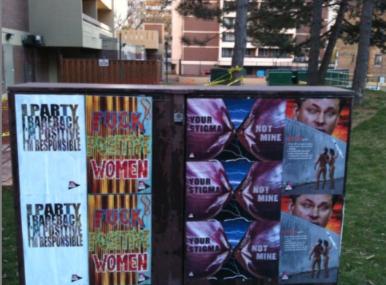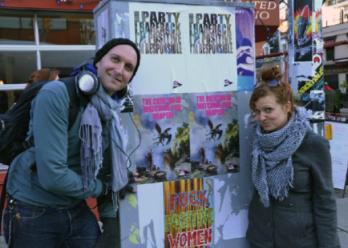
Credit: Rob Salerno
A block of posters on a hip stretch of Queen St repeatedly confronts passersby with the following text: “I Party. I Bareback. I’m Positive. I’m Responsible.”
This is just one of the messages Torontonians will soon see as a result of a massive downtown postering campaign by the activist group AIDS Action Now! (AAN).
The group, which formed in the ’80s in response to the HIV/AIDS epidemic and has recently been reinvigorated, hopes the provocative images will get people talking.
The campaign also appears online in anticipation of A Day With(out) Art, an event AAN is co-presenting with the Art Gallery of Ontario Youth Council on Nov 30, the eve of World AIDS Day.
“We wanted to do something that was innovative and that would change the discourse around HIV in the community,” says AAN’s Alex McClelland, who helped organize the action.
Each of the posters was made by a different artist in collaboration with members of the HIV/AIDS community; participants include such heavyweights as John Greyson, Kent Monkman and Allyson Mitchell. And though they all bring up different issues affecting the community, they are linked by their rejection of the stigmatization of people living with AIDS.
Mitchell’s piece, for instance, consists of a needlepoint that reads “Fuck Positive Women,” while a piece by Daryl Vocat depicts a park ranger writing the words “We are not criminals.”
A trend toward ostracizing people with HIV gives these messages added urgency. In the last decade, Canada has seen a remarkable increase of cases in which individuals’ failure to disclose a positive HIV status has resulted in criminal charges, ranging from sexual assault to murder. Most recently, Crown prosecutors succeeded in having attempted murder charges reinstated against an Ottawa man who failed to disclose.
With no clear prosecutorial guidelines around which activities have possible legal ramifications, poz people, their lovers and their potential lovers are faced with a society where their sexuality is not only demonized, but also criminalized.
“The current legal climate and subsequent cultural climate that is constructed through the criminalization of HIV nondisclosure actively impedes my ability to manage my health as a person living with HIV,” states Mikiki, a coordinator with the Toronto People Living with AIDS Foundation and the artist who created the “I Bareback” poster in collaboration with Scott Donald.
For Mikiki, the legal situation is part of a larger poz-phobic paradigm where people living with AIDS are seen as inherently unhealthy and irresponsible. The reality latent in the poster, however, is that people living with AIDS can, and do, have normal sex lives on their own terms. And that can include partying and having sex without condoms.
“Negative people are seen as responsible whether they participate in these behaviours or not, but we’re seen as inherently irresponsible because we have tested positive for HIV. But I flip it on its head: I got tested because I care about my health and care about my partners’ health,” Mikiki says. “We are active agents managing our sex lives, and the poster wants to speak to that.”
The messages of Mitchell’s and Mikiki’s posters thus approach pressing legal issues on the level of individual empowerment.
“Us reaffirming our sexualities as people living with HIV is a political counter to the reality of us being criminalized,” says McClelland. “They don’t want us to claim our sexuality; the state doesn’t want poz people to do that.”
“[The posters] are super sex positive, and these messages are definitely not out there,” says AAN’s Jessica Whitbread, who collaborated with Mitchell on her poster. “That’s not really talked about when it comes to positive women. A lot of the time, it’s mothers and babies and nurturing and ‘the good woman.’ There’s an underrepresentation of women’s sexuality. Sometimes women just want to get fucked. And they can get laid, too.”
Whitbread’s sexual politic is informed by her own unique experience, having contracted HIV from a man who was later taken to court by two other women for nondisclosure, resulting in aggravated sexual assault charges. In recounting her story, she too approaches poz sexuality in terms of responsible interactions.
“I’m glad I didn’t pursue [legal charges],” she explains. “One of the girls had a one-night stand, and I was like, Where was her responsibility to use a condom? Why is she not being charged? She didn’t even test positive. I was just like, What are you so upset about? Did you talk about it? Did you bring it up?”
While the poster art aims to encourage people living with HIV to manage their own sexualities, it is also directed at those who might vilify any model for sexual health that is outside of the prescribed condoms-always-forever model. That AAN is an activist group, as opposed to a public health group or service provider, provides the autonomy necessary to confront this taboo.
“We have a good opportunity with AIDS Action Now! to say what other organizations can’t say. Public-health messaging never wants to tell people living with HIV that they can have sex without condoms with each other, or that gay men can use their own judgment around how they practise safe sex,” says McClelland.
Whitbread agrees: “As much as it’s art, it’s also an educational tool that hopefully loosens some screws in peoples minds, where they say, ‘Oh, I can do that? You can do that?’ and they create a dialogue or find out more information or talk to their friends about what that would look like.”
The taboo messaging and public nature of the campaign thus challenges the entire community to engage with these issues.
“This is everyone’s business,” says John Greyson, whose poster addresses harm reduction in prisons. “It’s everyone’s responsibility when healthcare is failing, when treatment is unavailable and lives are being threatened.”
Besides being plastered on Queen St, on Church St, in Parkdale and in Kensington Market, the images are being spread online through a Tumblr blog before their official launch at the AGO. And it is no mistake that the campaign, which AAN is calling “poster/virus,” overlaps with the gallery’s retrospective of queer artist trio General Idea. Their widespread revision of Robert Indiana’s “LOVE” graphic as “AIDS” is a seminal project for AIDS-related art and furthered the metaphor of the “image as virus” in the context of HIV.
The Day With(out) Art event will feature the poster art but will also take the form of a mock-protest performance in the gallery’s Walker Court. It will host speakers (including Mitchell, Whitbread and Mikiki), DJs and performances by the Kiki Ballroom Alliance and the Ontario Aboriginal HIV/AIDS Strategy.
In the meantime, AAN hopes the street posters create controversy and discussion, no matter how difficult it may be.
“These conversations are fucking excruciating,” Mikiki admits. “Especially when you’re not used to having them.”

 Why you can trust Xtra
Why you can trust Xtra


